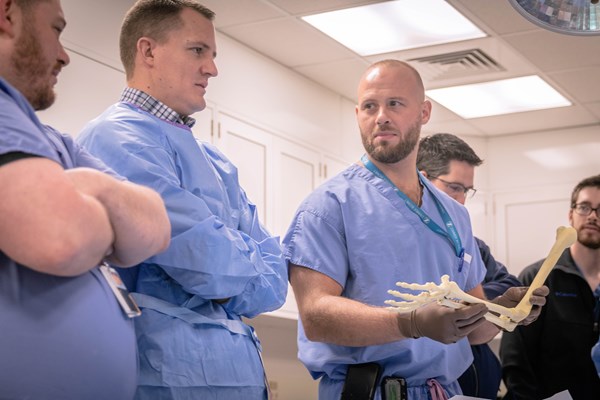Outline of Residency

Benefits
- Free parking is provided.
- A cafeteria card with ample on-call meal money.
- Residents receive eBooks and core texts for didactic lectures.
- Residents are provided loupes.
- Residents are provided lead as well as lead glasses.
- Funding is provided by the department to send residents to one conference a year.
- Funding is also available to send residents to conferences to present original research. (This is at the discretion of the Program Director)
- Resident benefits include a choice of health care packages for the individual as well as discounts on family plans. A mandatory retirement savings plan of 6% is matched by the hospital into a TIAA/CREF plan. Disability insurance is provided. Dental and eye programs are available at discount rates.
- The starting PGY-1 salary
Residency Specifics
- All Orthopaedics call is from out-of-house, including intern call, but residents are expected to respond to all calls in a timely fashion so there is a maximum range from the hospital in which new residents must live.
- Residents are required to help with coding for consults and clinic visits. This allows them to successfully run an Orthopaedic practice after graduation.
- Residents rotate through different services during each level of training. Each service has a PGY5 or PGY4 and a junior resident. There is no pre-rounding by junior residents. Everyone works together to get things done efficiently. Residents on the sports medicine service provide care for WVU athletes, including training room visits, surgeries and on the field care.
- The Department of Orthopaedics contains its own orthopaedic library which includes all new editions of the major texts and journals.
- The departmental residents’ room includes 5 desktop computers as well as wifi connectivity. Each resident has their own cubical space for storage of books and personal items.
- Residents are required to produce at least one research manuscript of publishable quality before graduation and must present it at the annual Research Day conference.
- Residents are encouraged to dissect in the microsurgery lab and use the arthroscopy models / cadavers to improve surgical skills.
- Teaching is a primary concern of the Department. In addition to the basic and clinical science lecture series, we have weekly grand rounds, a monthly orthopaedic journal club, subspecialty conferences and journal clubs and anatomy and psychomotor skills conferences. Residents are required to attend all of the weekly educational conferences.
- Residents are encouraged to participate in the teaching of WVU medical students and residents in other departments on musculoskeletal topics.